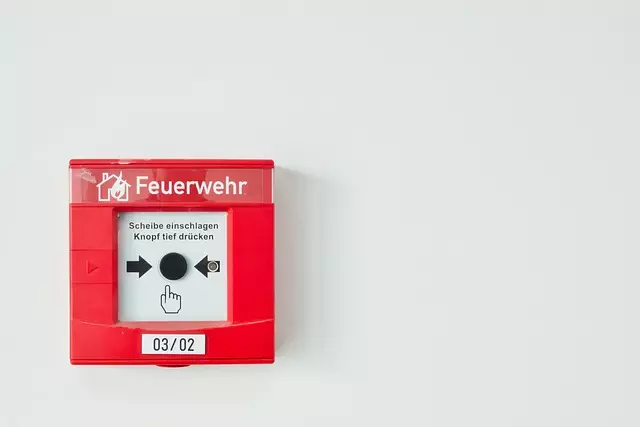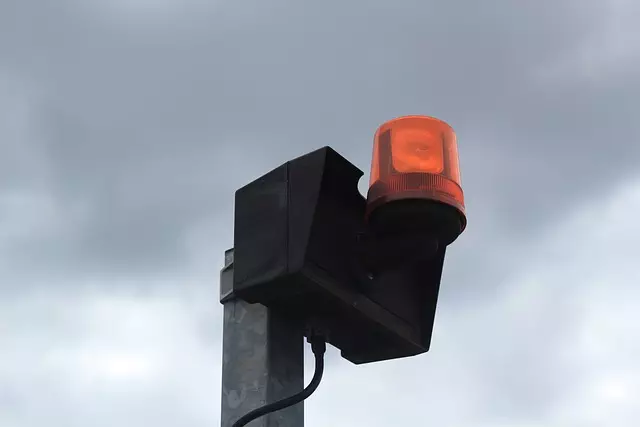Fire alarm system installations in Jacksonville, North Carolina, are a critical component of fire safety, requiring strategic placement and adherence to National Fire Protection Association (NFPA) guidelines to ensure optimal detection and coverage. Advanced technologies such as ionization, photoelectric, or dual-sensor smoke detectors, heat sensors, and sprinkler systems are integrated into the installation to provide early warning and effective containment of fires. Regular testing and maintenance by certified professionals, following NFPA 72 standards, are essential to maintain system reliability and accuracy, safeguarding lives and property against potential fire threats in Jacksonville and beyond.
When it comes to safeguarding properties from the perils of fire, a robust fire alarm system installation is paramount. This article delves into the intricacies of fire alarm system installation in Jacksonville, North Carolina, emphasizing best practices tailored for the region’s unique requirements. From grasping the essential components and their functions to adhering to stringent regulatory standards, each aspect is meticulously covered. Homeowners and businesses in Jacksonville will benefit from insights on conducting thorough site assessments, selecting appropriate hardware, and optimally placing detectors and alarms. Additionally, the integration of cutting-edge features like smoke detection and heat sensors, coupled with sprinkler systems, ensures a comprehensive fire safety solution. Furthermore, testing and maintenance protocols are highlighted to ensure these systems remain reliable and effective. This guide is an indispensable resource for anyone looking to enhance their fire alarm system installation in Jacksonville, North Carolina, adhering to the highest standards of safety and compliance.
- Understanding Fire Alarm System Components and Their Roles in Jacksonville, North Carolina
- Regulatory Compliance for Fire Alarm Installation in Jacksonville, NC
- Site Assessment and Survey Essentials for Effective Fire Alarm System Design
- Selecting the Right Fire Alarm System Hardware for Your Jacksonville Property
- Strategic Placement of Detectors and Alarms: Best Practices for Maximum Safety
- Integrating Advanced Features: Smoke Detection, Heat Sensors, and Sprinkler Systems
- Testing and Maintenance Protocols to Ensure Continuous Fire Alarm System Reliability in Jacksonville, NC
Understanding Fire Alarm System Components and Their Roles in Jacksonville, North Carolina

In Jacksonville, North Carolina, a well-designed and properly installed fire alarm system plays a critical role in safeguarding lives and property. Fire alarm system installation in Jacksonville, North Carolina, must be carried out with an understanding of the system’s intricate components and their interdependent functions. The cornerstone of any fire detection setup is the smoke and heat detectors, which are strategically placed throughout a building to identify the presence of fire at its earliest stages. These detectors are connected to a central control panel that not only processes the information but also alerts the occupants and local fire departments when a potential threat is detected. The control panel acts as the brain of the system, coordinating with other components such as manual pull stations, which allow occupants to trigger an alarm manually in case of an emergency.
A robust fire alarm system installation in Jacksonville, North Carolina, also includes audio and visual alarm notification appliances that effectively communicate the danger to everyone within the building. This ensures a timely evacuation, potentially saving lives. Additionally, the system may be equipped with sprinkler supervisory alarms that monitor the water flow and activate if maintenance is needed, ensuring the sprinkler system is ready to combat fires when they occur. The integration of these components must be tailored to the specific needs and layout of each building, which is why professional installation services are crucial for compliance with both local regulations and national fire protection standards, such as NFPA 72. In Jacksonville, North Carolina, adhering to best practices in fire alarm system installation not only meets legal requirements but also offers peace of mind, knowing that the installed system will function reliably when called into action.
Regulatory Compliance for Fire Alarm Installation in Jacksonville, NC

Jacksonville, North Carolina, adheres to stringent regulatory standards for fire alarm system installation due to its unique geographical and demographic considerations. The National Fire Protection Association (NFPA) and the International Building Code (IBC) serve as guiding frameworks for fire alarm system installations within the municipality. These codes mandate that systems are not only installed correctly but also maintained regularly to ensure optimal functionality and immediate response in the event of a fire. Local authorities having jurisdiction (AHJs) in Jacksonville, including the Jacksonville Fire Department, enforce these regulations, which require compliance with the latest versions of NFPA 72: National Fire Alarm Code. This code outlines specific requirements for the design, installation, and maintenance of fire alarm systems to protect life and property.
Professionals involved in the fire alarm system installation in Jacksonville, North Carolina, must be well-versed in these codes and standards to ensure that their work meets all necessary criteria. This includes understanding zoning requirements, selecting appropriate devices, and implementing a system that can interface with other life safety systems within a structure. The use of advanced technology and equipment is also crucial for accurate detection and swift communication to the relevant authorities. By adhering to these best practices in fire alarm system installation, Jacksonville, NC, ensures that its residents and buildings are safeguarded against the dangers posed by fires. Adherence to these codes not only complies with local laws but also contributes to a safer environment for all.
Site Assessment and Survey Essentials for Effective Fire Alarm System Design

When embarking on a fire alarm system installation in Jacksonville, North Carolina, or any other locale, a thorough site assessment and survey are paramount for effective design. This initial step involves a detailed analysis of the property to identify all potential fire hazards and occupancy characteristics. A competent installer will conduct a comprehensive evaluation, considering factors such as building layout, structural elements, and the specific needs of the facility. This ensures that the system’s layout and components—including smoke detectors, heat sensors, manual pull stations, and notification appliances—are strategically placed to maximize safety and compliance with local fire codes and standards.
The survey process also encompasses evaluating existing infrastructure to ascertain its capacity to integrate with the new fire alarm system. This includes assessing electrical systems, communication pathways, and potential interference sources. The goal is to design a system that not only adheres to the National Fire Alarm and Signaling Code (NFPA 72) but also functions reliably under various conditions. In Jacksonville and across North Carolina, understanding the unique characteristics of each site is crucial for fire alarm system installation projects. It guarantees that the end product will be tailored to provide early warning and prompt evacuation in case of an emergency, thereby safeguarding lives and property.
Selecting the Right Fire Alarm System Hardware for Your Jacksonville Property

When it comes to safeguarding your Jacksonville property in North Carolina from fire hazards, selecting the right fire alarm system hardware is paramount. The process begins with a thorough assessment of your property’s specific needs, including its size, layout, occupancy, and potential fire risks. This initial evaluation will guide the choice of components such as smoke detectors, heat sensors, manual pull stations, and control panels that are most suitable for your setup. It is essential to work with reputable providers who specialize in fire alarm system installation in Jacksonville, ensuring that the equipment meets local building codes and regulations. These professionals can offer tailored solutions, from wireless systems for complex architectures to hardwired configurations for high-risk environments.
Once the appropriate hardware has been chosen, the next step is to ensure its proper integration into your property’s infrastructure. This involves careful planning to minimize disruptions during installation and to maintain the integrity of both the fire alarm system and the existing structure. In Jacksonville, North Carolina, the climate and environmental factors can impact the performance of a fire alarm system; thus, selecting hardware that withstands these conditions is crucial. Additionally, the system should be designed for ease of maintenance and testing, as regular upkeep is necessary to ensure its reliability in the event of an emergency. By investing in a well-selected and professionally installed fire alarm system, property owners in Jacksonville can provide their occupants with the highest level of safety and compliance with fire safety standards.
Strategic Placement of Detectors and Alarms: Best Practices for Maximum Safety

When installing a fire alarm system in Jacksonville, North Carolina, or any region, strategic placement of detectors and alarms is paramount for maximizing safety and ensuring timely response to potential fires. A well-planned layout considers the building’s architecture, occupancy type, and fire hazards present. Detectors should be installed according to the National Fire Protection Association (NFPA) guidelines, which provide zones and classifications that dictate the optimal placement for smoke and heat detectors. These devices should be placed at the ceiling or high on walls, avoiding areas where false alarms are likely to occur due to steam, cooking fumes, or other non-fire related particulate matter.
Alarms, on the other hand, need to be positioned where they are audible to all occupants without causing undue alarm or interference with daily activities. Visual alerting devices, such as strobe lights, should complement auditory alarms, especially in areas for individuals with hearing impairments. The installation process must also account for the speed and direction of smoke movement within the building, ensuring that detectors are placed to detect fires as early as possible. Regular maintenance and testing of both detectors and alarms are crucial to maintaining a fully operational fire alarm system. This includes calibrating sensors, checking batteries, and inspecting alarm sound levels, all of which contribute to the reliability and effectiveness of the fire alarm system installation in Jacksonville, North Carolina, and beyond.
Integrating Advanced Features: Smoke Detection, Heat Sensors, and Sprinkler Systems

When it comes to safeguarding properties and lives, integrating advanced features into fire alarm system installations is paramount. In Jacksonville, North Carolina, as well as across the nation, the latest advancements in fire safety technology are not just recommended but often mandated for new constructions and significant renovations. A robust fire alarm system installation in Jacksonville, NC, should include smoke detection systems that utilize ionization, photoelectric, or dual-sensor technology to swiftly identify the presence of smoke, thereby providing an early warning of potential fires. These systems are designed to differentiate between various types of smoke particles, which can indicate a range of fire classifications, from fast-burning blazes to smoldering fires hidden within walls.
Heat sensors, another critical component, monitor the ambient temperature changes within a structure to detect the onset of heat associated with a fire. These sensors are strategically placed to cover all areas of a building, ensuring comprehensive coverage and rapid detection. When combined with an advanced sprinkler system, which is also a key element in a fire alarm system installation in Jacksonville, NC, the risk of fire damage is significantly reduced. Sprinkler systems not only activate upon reaching a certain temperature but are also designed to react specifically where the heat source is located, minimizing water damage by operating individually rather than across the entire system. This targeted response can extinguish a fire or at least contain it until the fire department arrives, saving valuable time and property. For those looking to adhere to the best practices in fire alarm system installation, integrating these advanced features is essential for optimal performance and peace of mind.
Testing and Maintenance Protocols to Ensure Continuous Fire Alarm System Reliability in Jacksonville, NC

In Jacksonville, NC, ensuring the reliability of fire alarm systems is paramount for the safety of residents and businesses. A robust testing and maintenance protocol is essential to maintain the functionality and accuracy of a fire alarm system installation from Jacksonville, North Carolina. These protocols involve regular inspections and tests conducted by certified professionals who can verify that all components, including smoke detectors, alarms, control panels, and wiring, are functioning correctly. The National Fire Protection Association (NFPA) provides guidelines that should be adhered to, with NFPA 72: National Fire Alarm Code being the benchmark for fire alarm system installation in Jacksonville. This code outlines the specific requirements for the installation, maintenance, and testing of fire alarm systems, ensuring they are ready to respond accurately when required.
Maintenance goes beyond routine checks; it includes updating software within the system, which can prevent false alarms and ensure that any new technologies or updates in the fire alarm system installation are compatible with existing hardware. In Jacksonville, NC, businesses and homeowners should also consider the environmental factors that could affect their systems, such as humidity, dust, and corrosive elements. Regular cleaning, battery checks, and assessments for physical damage are critical to prevent malfunctions under pressure. By implementing a comprehensive testing and maintenance protocol, residents and businesses in Jacksonville can trust their fire alarm system installation to provide the necessary protection against fires, thereby safeguarding lives and property.


